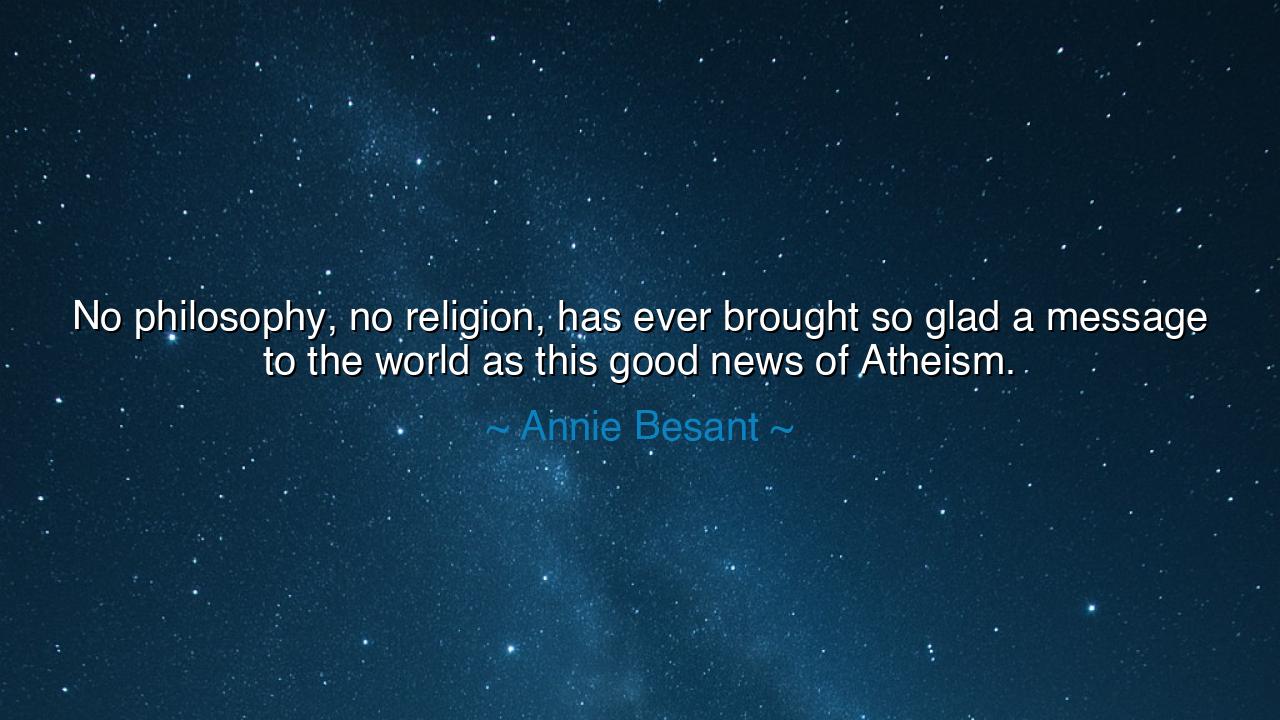
No philosophy, no religion, has ever brought so glad a message to
No philosophy, no religion, has ever brought so glad a message to the world as this good news of Atheism.






"No philosophy, no religion, has ever brought so glad a message to the world as this good news of Atheism." These words from Annie Besant, a prominent British theosophist and social reformer, reflect a bold and transformative vision. Atheism, in Besant's view, is not a mere absence of belief in the divine but a revelation of freedom, self-reliance, and a deep embrace of human potential. Besant's statement calls us to consider how Atheism, as a philosophy, has the power to liberate the individual from the constraints of religious dogma, freeing the mind to explore life without the burden of supernatural explanations. For her, Atheism brings a message of joy, as it invites us to celebrate life and the human experience without the promise of divine intervention or afterlife.
The origin of this thinking can be traced back to the ancient philosophers, many of whom questioned the existence of the gods or challenged conventional religious beliefs. Epicurus, for instance, argued that the gods were indifferent to human affairs, and that the pursuit of pleasure and contentment in this life was the true purpose of human existence. Epicurus taught that humans should seek happiness through rational thought and understanding, not through appeasing gods or relying on divine providence. This, too, reflects Besant's belief in Atheism: a call for humans to embrace life fully, relying on their own faculties to navigate existence rather than waiting for salvation from an external source.
Consider the story of Socrates, the Greek philosopher who, much like Besant, questioned the established beliefs of his society. In his trial for corrupting the youth and impiety, Socrates famously declared, “I know that I am wise because I know that I know nothing.” Socrates, though not an atheist in the modern sense, rejected the conventional religious views of his time, and instead encouraged individuals to engage with reason, knowledge, and the pursuit of virtue. His life was a testament to the power of human intellect and moral courage. In a world filled with religious zealotry, Socrates' insistence on critical thinking and self-examination helped lay the foundation for an empowered, rational approach to life, free from the fetters of religious dogma — much like Atheism does for modern minds.
Atheism, as Besant described, also offers a profound sense of empowerment. It suggests that humans are the architects of their own fate, responsible for shaping their destinies through their actions, not through submission to a higher power. The Enlightenment, with thinkers like Voltaire, Rousseau, and Diderot, championed reason and human autonomy, much as Besant later did. The scientific revolution, fueled by minds like Newton and Darwin, further shifted the focus away from divine creation and intervention, instead offering explanations rooted in natural law and evolutionary science. The very concept of self-determination and human progress became central to Western thought, and Atheism, with its embrace of human potential and rationality, helped shape this narrative.
But Atheism, as Besant understood it, is not just about rejecting religion; it is about finding a new kind of meaning in the world. In many ways, Atheism challenges us to see life as a precious and singular experience, one to be embraced fully. Without the promise of an afterlife or the reliance on divine justice, we are called to create our own meaning here and now. Albert Camus, in his work on the myth of Sisyphus, argued that life itself can be absurd, but it is in the act of embracing that absurdity and living in spite of it that we find true freedom and authenticity. Like Camus, Besant’s Atheism encourages us to create meaning, to forge our own path, and to celebrate existence as it is, not as we wish it to be.
The lesson embedded in Besant's words is profound: religion, in many of its forms, seeks to offer us a sense of comfort and purpose by pointing to a divine order beyond our comprehension. Yet, Atheism invites us to take responsibility for our own lives and our own destinies. It is an invitation to embrace life in all its complexity, without the crutch of supernatural explanations. Atheism, in Besant’s view, frees us from fear and uncertainty, and empowers us to live authentically, with courage, self-reliance, and reason as our guiding principles.
In practical terms, embracing Atheism or a secular worldview means questioning the established norms, seeking truth through evidence and reason, and finding meaning in the here and now. It is not about rejecting morality or purpose, but about finding them through human experience, relationships, and actions. Seek knowledge, cultivate compassion, and live with the understanding that our time here is finite. We must make it count, not by relying on an afterlife, but by living fully, with integrity, and striving to leave the world better than we found it. This is the true message of Atheism — the joy and power of creating our own meaning in a world we shape with our own hands and minds.






AAdministratorAdministrator
Welcome, honored guests. Please leave a comment, we will respond soon